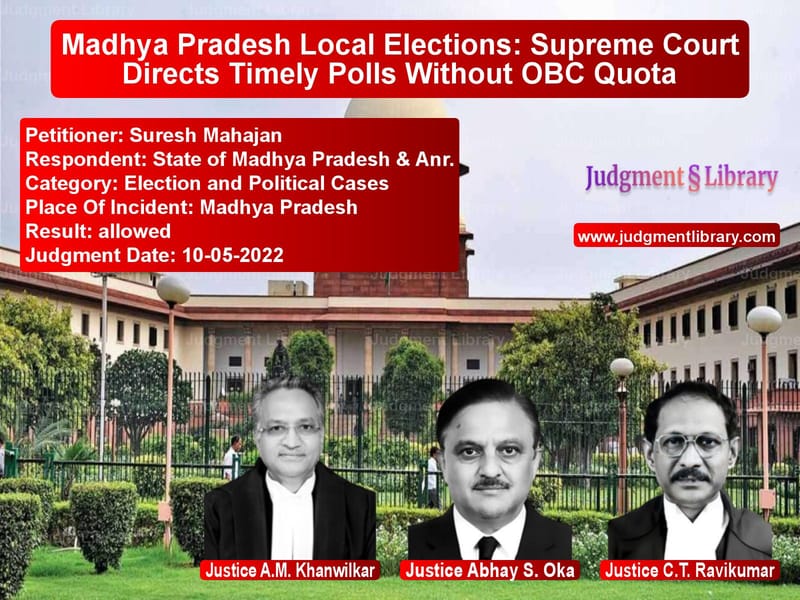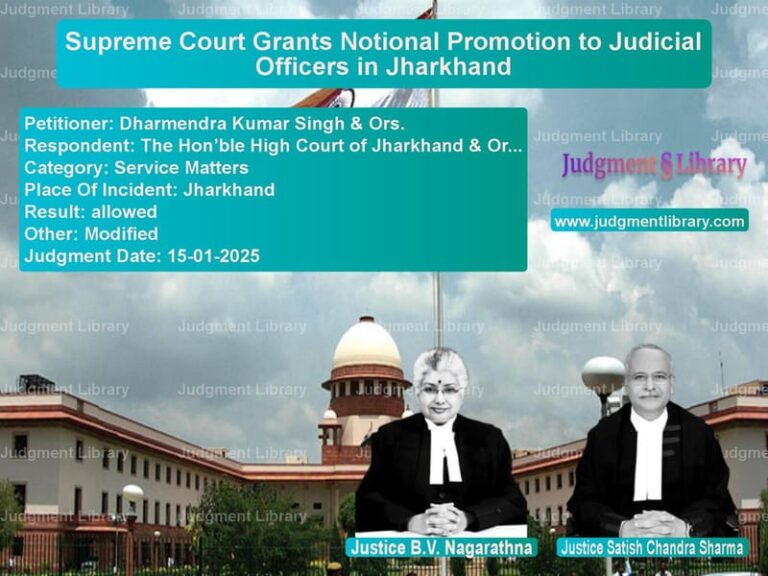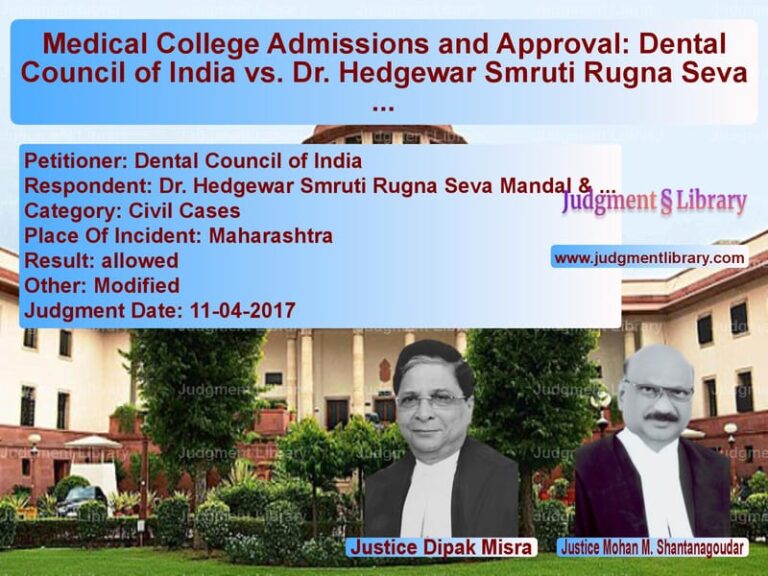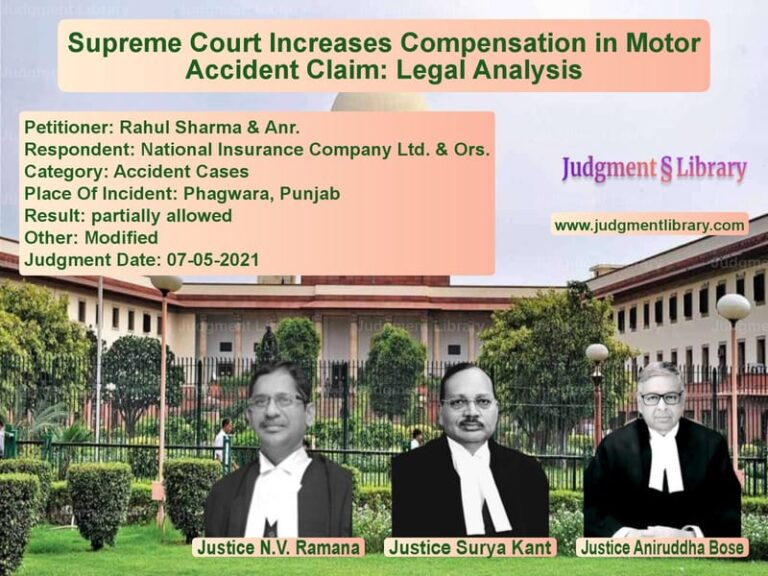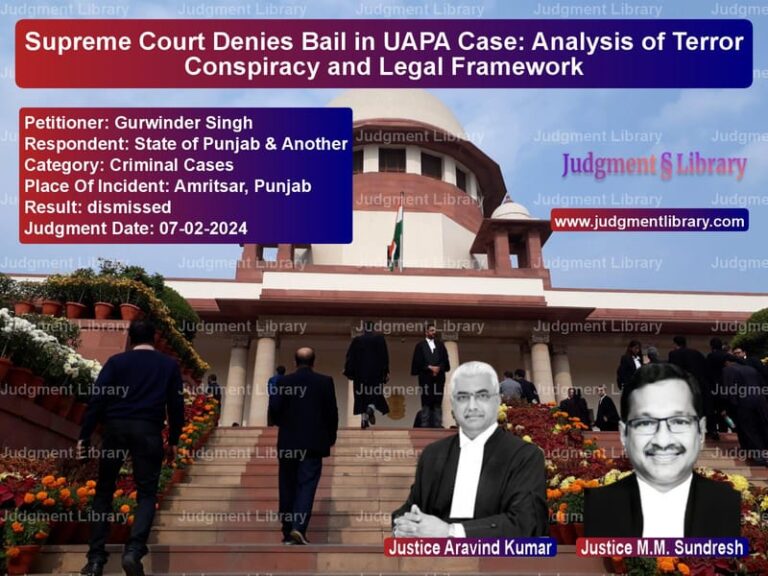Madhya Pradesh Local Elections: Supreme Court Directs Timely Polls Without OBC Quota
The Supreme Court of India recently ruled on a crucial issue concerning the delay in conducting local body elections in Madhya Pradesh. The case, Suresh Mahajan vs. State of Madhya Pradesh & Anr., revolved around the state government’s failure to hold timely elections due to pending implementation of the Other Backward Classes (OBC) reservation process. The apex court directed the Madhya Pradesh State Election Commission (SEC) to proceed with local elections without waiting for the completion of the OBC reservation formalities, emphasizing the constitutional mandate for timely elections.
Background of the Case
The petitioner challenged the constitutional validity of amendments to the Madhya Pradesh Municipal Act, 1956, the Madhya Pradesh Panchayat Raj Avam Gram Swaraj Adhiniyam, 1993, and the Madhya Pradesh Municipalities Act, 1961. These amendments authorized the state government to determine the number and extent of wards in local bodies. The petitioner contended that these changes usurped the independence of the SEC and violated constitutional provisions for autonomous local governance.
The case also involved a broader issue concerning the non-conduct of elections in over 23,263 local bodies across the state. The state government cited the pending fulfillment of the triple test requirement for OBC reservation, as per the Supreme Court’s decision in Vikas Kishanrao Gawali vs. State of Maharashtra, as the reason for delaying the polls.
Arguments of the Petitioner
- The petitioner argued that local body elections had been pending for an unreasonably long period, violating the constitutional mandate.
- They contended that the state government was deliberately delaying elections under the pretext of completing the OBC reservation process.
- They asserted that the amendments allowing the state to determine ward structures undermined the SEC’s authority and violated the principle of free and fair elections.
- They requested immediate elections to restore democratic governance at the local level.
Arguments of the Respondents
- The state government defended the amendments, stating that they were necessary to ensure proper representation at the local level.
- They argued that elections could not be held until the OBC reservation process was completed in compliance with the triple test requirement.
- The state cited administrative challenges and the COVID-19 pandemic as additional reasons for the delay.
- They sought additional time to finalize the reservation policy before conducting elections.
Supreme Court’s Judgment
The Supreme Court issued a landmark ruling emphasizing that the constitutional mandate of conducting timely elections cannot be violated. The key directives were:
- “The ongoing process of delimitation or formation of wards cannot be a ground to delay local elections.”
- “The triple test formalities for OBC reservation cannot be a pretext to stall elections, as democracy cannot be held hostage to administrative delays.”
- The SEC was directed to issue an election schedule for all local bodies within two weeks.
- It clarified that until the OBC reservation process was completed, elections should be conducted without OBC reservations.
- The Court ruled that any pending High Court orders delaying elections stood superseded by this ruling.
Key Takeaways from the Judgment
- Timely elections are a constitutional mandate: The Court reaffirmed that local body elections must be conducted without undue delays.
- OBC quota cannot be an excuse for postponement: If the state fails to complete the reservation process on time, elections must proceed without OBC reservations.
- State government cannot control election scheduling: The ruling ensures that the SEC retains autonomy in conducting elections.
- Legal precedence for future cases: This ruling sets a precedent for other states facing similar election delays due to pending reservation policies.
Conclusion
The Supreme Court’s decision in this case strengthens the democratic process by ensuring that local body elections are held on time. By directing the Madhya Pradesh SEC to conduct elections without waiting for OBC reservation formalities, the Court has reinforced the importance of electoral continuity. The ruling serves as a reminder that administrative and political hurdles cannot override the constitutional commitment to democratic governance.
Petitioner Name: Suresh Mahajan.Respondent Name: State of Madhya Pradesh & Anr..Judgment By: Justice A.M. Khanwilkar, Justice Abhay S. Oka, Justice C.T. Ravikumar.Place Of Incident: Madhya Pradesh.Judgment Date: 10-05-2022.
Don’t miss out on the full details! Download the complete judgment in PDF format below and gain valuable insights instantly!
Download Judgment: suresh-mahajan-vs-state-of-madhya-prad-supreme-court-of-india-judgment-dated-10-05-2022.pdf
Directly Download Judgment: Directly download this Judgment
See all petitions in Public Interest Litigation
See all petitions in Legislative Powers
See all petitions in Judgment by A M Khanwilkar
See all petitions in Judgment by Abhay S. Oka
See all petitions in Judgment by C.T. Ravikumar
See all petitions in allowed
See all petitions in supreme court of India judgments May 2022
See all petitions in 2022 judgments
See all posts in Election and Political Cases Category
See all allowed petitions in Election and Political Cases Category
See all Dismissed petitions in Election and Political Cases Category
See all partially allowed petitions in Election and Political Cases Category

